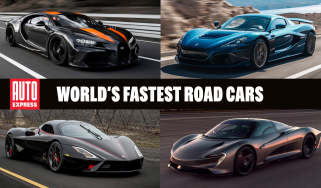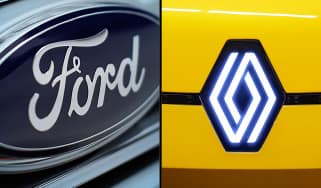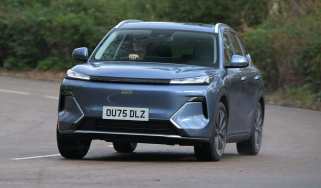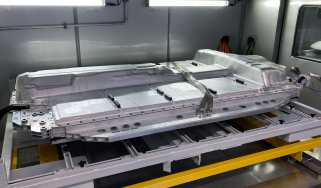McLaren SUV to get hybrid V8 power: new 4-door is crucial to British brand's future
Latest leaks suggests McLaren's upcoming SUV will get V8 hybrid power, not electric
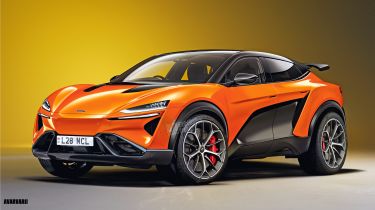
McLaren has made the call on what will power its first ever SUV: V8 hybrid power.
The British sports car maker was known to be exploring the SUV market under previous boss Michael Leiters, who left McLaren after it was acquired by Abu Dhabi investment fund CYVN Holdings in April 2025 and is the new CEO at Porsche. New McLaren Group Holdings CEO Nick Collins has turbocharged this plan and shown the SUV to key US dealers, trade title Automotive News is reporting.
Leiters’ vision was for a swooping, sporty SUV that would be priced above £200,000 and take on low-volume, high-price rivals, the Aston Martin DBX and Ferrari Purosangue. The SUV was set to be powered by a detuned version of the W1 hypercar’s 1,234bhp drivetrain, which blends a 4.0-litre twin-turbo V8 with a high-output electric motor, and McLaren was in talks with global automotive players to buy in or co-develop a suitable vehicle architecture.
New CEO Collins appears to have come to a similar conclusion and ruled out pure electric power for the four-door McLaren. Sources have told Auto Express that McLaren’s dealer base had canvassed customers and found little to no demand for an electric SUV from the fabled F1 brand.
“I believe every brand must have a multi-propulsion future,” Nick Collins told Auto Express in July at the Goodwood Festival of Speed. “The pace of regulatory change and consumer adoption is different in different parts of the world. Are we going to make McLaren an all-electric brand? Absolutely not.”
The mighty McLaren has been designed by chief creative officer Alister Whelan, who spent more than 20 years at Jaguar working alongside Ian Callum on brilliant designs including the I-Pace, F-Type and 2009 XJ –cars that are now at extremely tempting prices through the Auto Express Buy A Car service.
Until the acquisition of McLaren Automotive (plus a minority stake in the brand’s Formula 1 team), former Jaguar Land Rover R&D boss Collins was establishing British autos engineering start-up Forseven for CYVN. It had already acquired the technology division of Gordon Murray Automotive and a 20 per cent stake in Chinese electric car maker Nio. “We have access to certain Nio technologies with our licence. And that's an amazing opportunity, because, frankly, some of the best automotive technology in the world is in China,” Nick Collins told us.
Sources say Forseven was working on two electric SUVs to take on the Range Rover and Range Rover Sport, tapping into Nio electric technology. But any notion to fold those proposals into the McLaren SUV concept seem to have been ruled out.
That’s a logical move given the lack of demand for luxury electric vehicles: the zero-emissions Range Rover is running two years late, Bentley has also delayed its Luxury Urban SUV and Lamborghini is repurposing its electric Lanzador coupe-SUV as a hybrid.

Nick Collins was at the heart of the deal for CYVN to acquire McLaren Automotive. “This transaction with McLaren was my initial suggestion,” he explained. He joined Forseven in January 2024 and “very shortly after, I was starting to suggest we look [at the acquisition]. So everything Forseven was doing from the middle of 2024 onwards, was with a target picture of where we got to [in] April.”
At a stroke, McLaren Automotive – which veered from one funding crisis to the next in the later years of its Bahraini ownership, ultimately losing around £900 million in 2023 – is on a stronger financial footing. Nonetheless costs must be cut to hasten breakeven, with 500 jobs going across the group.
“We’ve cleared all the debt,” the new CEO confirmed. “We’ve recapitalised the business and we’ve got an incredible board of directors.”
Legendary ex-Ferrari CEO Luca di Montezemolo has joined as an advisor, supplementing former Rolls-Royce Cars boss Torsten Müller-Otvös and McLaren’s hugely experienced executive chairman Paul Walsh.
Along with Collins, this experienced team will need to decide the new McLaren portfolio. There’s still no official word on the McLaren SUV’s price point, the vehicle architecture and how much of McLaren’s trademark carbon fibre it will use, and where the cars will be assembled.
Automotive News reports that a new high-performance version of the 750S is due in 2027, while there will be developments in the Artura supercar segment. McLaren Automotive’s huge 2023 loss stemmed from a long delay to the V6 hybrid Artura’s launch. While media have lauded the driving experience – the Artura is Auto Express’s reigning performance car of the year – a rogue part caused some early vehicle fires, and software issues scuppered its roll-out.
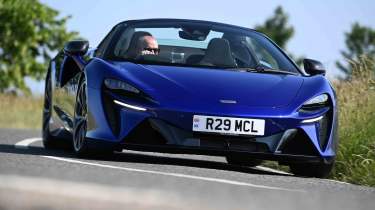
A complete reskin would make sense: that’s a long-established Ferrari tradition, which has most recently transformed the V8 Roma coupe into the Amalfi. Coming first is the McLaren W1 hybrid hypercar: it’s still on course for launch in 2026.
McLaren is also considering a more emotive marketing strategy, mirroring the Drive To Survive approach of humanising people such as founder Bruce McLaren, and surfing McLaren’s on-track renaissance. “The brand is amazing,” says Collins. “You see what's happening in racing. I was lucky enough to be at Silverstone [for the British Grand Prix]. The love for [the] papaya orange [racing livery] is phenomenal.”
The new CEO concludes: “This isn't about surviving the next five years or to the next equity injection. This is about building a sustainably profitable company that continually reinvests in itself. A company that’s on the world stage, which the country should be proud of.”
Did you know you can sell your car with Auto Express? Get the highest bid from our network of over 5,500 dealers and we'll do the rest. Click here to try Auto Express Sell My Car now...




